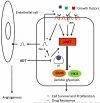Prostate cancer progression after androgen deprivation therapy: mechanisms of castrate resistance and novel therapeutic approaches
- PMID: 23752182
- PMCID: PMC3908870
- DOI: 10.1038/onc.2013.206
Prostate cancer progression after androgen deprivation therapy: mechanisms of castrate resistance and novel therapeutic approaches
Abstract
Prostate cancer is the second-leading cause of cancer-related mortality in men in Western societies. Androgen receptor (AR) signaling is a critical survival pathway for prostate cancer cells, and androgen-deprivation therapy (ADT) remains the principal treatment for patients with locally advanced and metastatic disease. Although a majority of patients initially respond to ADT, most will eventually develop castrate resistance, defined as disease progression despite serum testosterone levels of <20 ng/dl. The recent discovery that AR signaling persists during systemic castration via intratumoral production of androgens led to the development of novel anti-androgen therapies including abiraterone acetate and enzalutamide. Although these agents effectively palliate symptoms and prolong life, metastatic castration-resistant prostate cancer remains incurable. An increased understanding of the mechanisms that underlie the pathogenesis of castrate resistance is therefore needed to develop novel therapeutic approaches for this disease. The aim of this review is to summarize the current literature on the biology and treatment of castrate-resistant prostate cancer.
Figures


References
-
- Huggins C. Prostatic cancer treated by orchiectomy; the five year results. J Am Med Assoc. 1946;131:576–81. - PubMed
-
- Small EJ, Schellhammer PF, Higano CS, et al. Placebo-controlled phase III trial of immunologic therapy with sipuleucel-T (APC8015) in patients with metastatic, asymptomatic hormone refractory prostate cancer. J Clin Oncol. 2006;24(19):3089–94. - PubMed
Publication types
MeSH terms
Substances
Grants and funding
LinkOut - more resources
Full Text Sources
Other Literature Sources
Molecular Biology Databases
Research Materials

